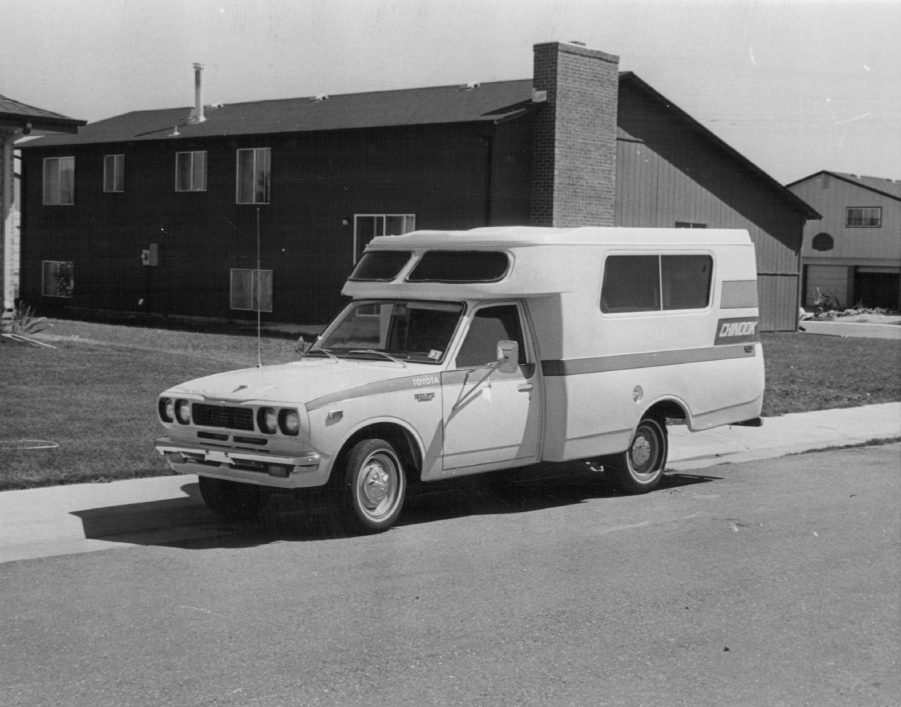
Check out the Original Toyota Chinook RV That Inspired the Tacozilla Camper
The Toyota Tacoma TRD based TacoZilla camper turned heads at the SEMA Motorshow this week. But those retro designs and clever features came from somewhere. Today we’re looking at the origins of Toyota campers, with the 1973 Toyota Chinook RV. Built on top of an indestructible truck, the Toyota Chinook was a much-needed micro-RV during the oil crisis.

The 1973 Toyota Chinook was the RV worlds answer to the oil crisis
The fiberglass shells were designed to be built right on top of any Toyota Hilux long-wheelbase half-ton truck chassis. And when the oil crisis emerged, suddenly small trucks like these were immensely popular. The engine in the truck was also small, a 2.0-liter inline-four that made 143 horsepower. And while not quick, it was enough to tug the lightweight camper along.
Speaking of which, unlike the Tacozilla camper, the Toyota Chinook didn’t start as a slide-in hardtop camper shell, but rather a conjoined popup. When opened, the Toyota Chinook boasted six feet of standing room. And when closed, the Toyota Chinook had better handling than large, lumbering RVs of the era. Eventually, a hard shell version of the Chinook would be built, but the popup had its advantages
With the aerodynamic popup camper design paired to a smaller engine, the Toyota Chinook could get 16 mpg in the city and up to 29 on the highway. All while still meeting California’s strict new emissions laws. This blasted the Chinook into popularity, a reliable, fuel-efficient RV that drove like a car.
The lack of a full bathroom was part of the reason the Toyota Chinook RV ended up being so economical, as it reduced weight. But the Chinook still featured sleeping for two adults from a convertible dinette, and a kitchenette with a sink and two-burner stove. Portable toilets were offered later in the production run, but for weekend getaways, all you really needed was a place to cook and a place to sleep.
So while the Toyota Chinook is infamous in the RV world, what you may not have known is that the Chinook name has been around as long as Toyota’s has.
Chinook is an RV manufacturer of its own
Toyota was founded in 1937, and Chinook, an RV and camper manufacturer, was founded a year later in 1938. At first, the company built small trailers and campers, but toward the 60s, as other RV manufacturers sprung up, Chinook solidified themselves as the “non-metallic” RV manufacturer. And in 1965, Chinook patented their fiberglass campers, trailers, and full-sized RVs.
After designing many camper shells, the Chinook 2200 and 2500 fully enclosed, Class A motorhomes were released. This was the company’s only RV they built from scratch, rather than using the frame of another truck. But as the 70s drew nearer, the Chinook company had been bought and sold on multiple occasions. The company’s identity was unclear.
Before this point, many of the fiberglass camper shells they manufactured, similar to the Tacozilla, were strapped to old Toyotas. After all, these shells were light. So the smaller trucks could handle the weight. And after years of seeing Toyota’s with Chinooks fitted to them, it only made sense for Toyota and Chinook to team up.
What became of the partnership was the most popular RV of the 70s. It was big enough for a family, incredibly reliable, and pretty cheap. At under $5,000 in 1973, or about $30,000 today, most families could afford it even during the oil crisis. And on the topic of reliability, many of those Toyota Chinooks are still buzzing around today.
The Toyota Chinook was a mass production RV, the Tacozilla is just a concept

Yes, the Toyota Tacozilla shell is pretty rad. But that’s only a concept that’ll never come to fruition, and I find concepts to be a bit ridiculous. Actual production models are what impress me, where the company takes that financial risk. Up until the Toyota Chinook point, the Japanese car manufacturer wasn’t known for its RVs, but they took the gamble and won big.
And while the Chinook was $30,000 in today’s money when new, you can find running examples for well under $10k. So if you’re considering the RV life, or just need a weekend getaway car, these Toyota Chinooks aren’t a bad option. Built on an infamously indestructible platform, cheap to buy, and easy to maintain (old cars and RVs will need more maintenance). And if you have questions, there’s a loyal Toyota Chinook fan base out there who can help you along the way.


